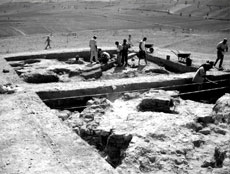 A
new archaeological expedition began in August of last year, exploring the most northern
Hittite city yet discovered, near Oymaağaç village (Vezirköprü, Samsun district). A
new archaeological expedition began in August of last year, exploring the most northern
Hittite city yet discovered, near Oymaağaç village (Vezirköprü, Samsun district).
The project is being conducted by Assoc. Prof. Dr. Rainer Czichon and Hittitologist Prof.
Dr. Jörg Klinger from the Freie Universität Berlin, with members of the Technical
Universities of Dresden and Stuttgart; Assistant Professor Thomas Zimmermann; and Acting
Chair, and specialist Ben Claasz Coockson of the Department of Archaeology and History of
Art at Bilkent University. Generous support has been provided by the Gerda Henkel
Foundation, Bilkent University, private donors, and Knauf Company.
These sponsors guaranteed the successful launch of the excavation. The urgent need for an
expedition in this barely researched region became obvious when the first fragments of
clay tablets with Hittite cuneiform script, and seal impressions with hieroglyphic signs -
the first written documents found so far into the Northern edge of the Hittite Empire -
were taken from surface surveys in 2005 and 2006.
The first campaign, ending in September, revealed the remains of a 2500 sqm Hittite
temple, and cult inventories like "libation cups." "This new project is a
unique chance to highlight the cultural development of the Black Sea hinterland, from the
prehistoric 3rd millennium BC to historical times, tracking the influence of different
ethnicities until the advent of the Hittites and beyond." says Dr. Zimmermann.
Dr. Czichon adds: "The presence of cuneiform documents already point to the
significance of Oymaağaç Höyük, and together with its geographical location and the
remains of monumental buildings, we have good reason to believe that this site is
identical to Hittite "Nerik", the residence of the Hittite Weather God Tesup,
where the Great Kings of the Hittite Empire had to do their pilgrimage to get their
kingship approved by this major deity. With Bilkent Archaeology as a strategic partner,
this scientific undertaking is on its way to becoming one of the major research projects
in Turkey for the next decade. It also offers an ideal chance to enhance the touristic
potential of this region."
Excavations continue next summer with Bilkent Archaeology students serving as field
experts for the scientific analysis of architecture and artifacts.

|







